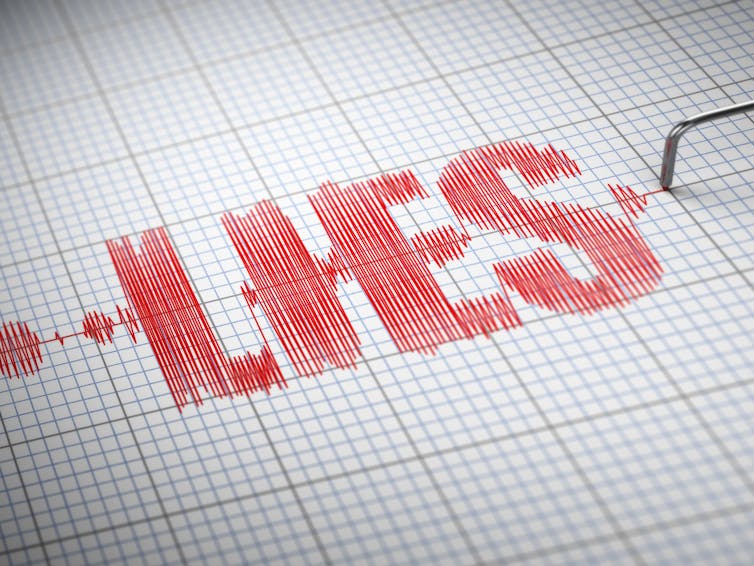The UK government recently announced it was planning to increase the use of polygraphs to monitor offenders on probation, specifically those convicted of terrorist offences.
This is one of several new measures to prevent a repeat of the recent London Bridge attack, which was committed by an offender out in the community on license. One difficulty with deciding which offenders can be released this way is that offenders can lie about their actions, thoughts and intentions to convince probation officers that they pose a low risk.
The government hopes that an increased use of polygraphs will help identify terrorists planning to reoffend. But are polygraphs actually able to do this?
Polygraphs are already in use in the UK for probation purposes. Since 2014, high-risk sex offenders have had to undergo polygraphs testing as part of their license conditions. Sex offenders are also routinely asked to undergo polygraphs in the US, but the practice is not common in other countries.
Although polygraphs are sometimes known as lie detectors, they don’t actually detect lies directly. Most modern polygraphs measure the interviewee’s heart rate, breathing rate and sweating while they are asked yes/no questions. These questions need to be simple and refer to a concrete event that is known by the interviewer. This makes it hard to use polygraphs to ask people what they plan to do in the future, because we don’t know enough to know the right questions to ask.
The polygraph picks up on any changes in breathing, heart or sweat rate during the interview. These changes can happen for many reasons. Sometimes a response is caused by the stress of lying. Sometimes they are an “orienting response”, people responding to something familiar or important to them.
This can be helpful to show that somebody knows something that they said they didn’t know (“guilty knowledge”). However, strong polygraph responses may also be due to shock or upset at the question or nervousness about the polygraph itself.
Better than average
So how accurate are polygraphs in actually detecting lies? There have been several reviews of polygraph accuracy. They suggest that polygraphs are accurate between 80% and 90% of the time. This means polygraphs are far from foolproof, but better than the average person’s ability to spot lies, which research suggests they can do around 55% of the time.
However, many of these polygraph studies involved people lying about clearly defined events in controlled experiments. It is possible that polygraphs are less accurate in real life probation cases. One study from 2006 attempted to estimate the accuracy of the polygraph with US sex offenders, but it relied on the offenders saying when the polygraph was wrong, which may not be entirely accurate.

Unfortunately, we don’t know how often probation officers suspect that offenders are lying and how good they are at identifying lies. So, we don’t know whether polygraphs are better than probation officers.
There are also concerns about when the polygraph is wrong. The test can be beaten by liars with knowledge of how polygraphs work and are used. These people may also be the ones that the probation officers are most interested in catching. They may have practised how to beat polygraphs precisely because they have very serious things to hide.
Some studies show that polygraphs are worse at detecting that people are telling the truth than detecting they are lying, in some cases indicating deception for almost half of the people who are actually telling the truth. This can be especially difficult to deal with in probation situations, where an offender may have no opportunity to prove that they were not lying when the polygraph indicates they are. How do you prove that you weren’t planning to reoffend?
Encouraging truth telling
However, there is another use for polygraphs in probation. They encourage people to confess. Forensic psychologist Theresa Gannon and her colleagues studied this on UK sex offenders in 2014. They found that offenders were more likely to disclose something of interest when using the polygraph (75%, instead of 51% without). This disclosure often happened after the polygraph had indicated deception. It may be that offenders feel forced to make a confession after failing the polygraph. However, the study could not tell whether these confessions are true.
After failing a polygraph, offenders may feel that further denials won’t be believed and confessing is best, even when they were not lying. This research suggests that the polygraph can be used to psychologically pressure offenders into disclosing self-incriminating information. Information that may not even be true.
So, is it a good idea for the government to increase polygraph use to monitor offenders? Research shows that they are nowhere near foolproof, but they may have some usefulness as a potential indicator of deception and to encourage truth telling.
However, using them raises several ethical questions. For example, it is fair to use them to try and extract self-incriminating statements?
Some people may argue that something is better than nothing and polygraphs are the best we’ve got. But in instances where polygraphs are so inaccurate that they give probation officers more useless than useful information, nothing may be better than something.

